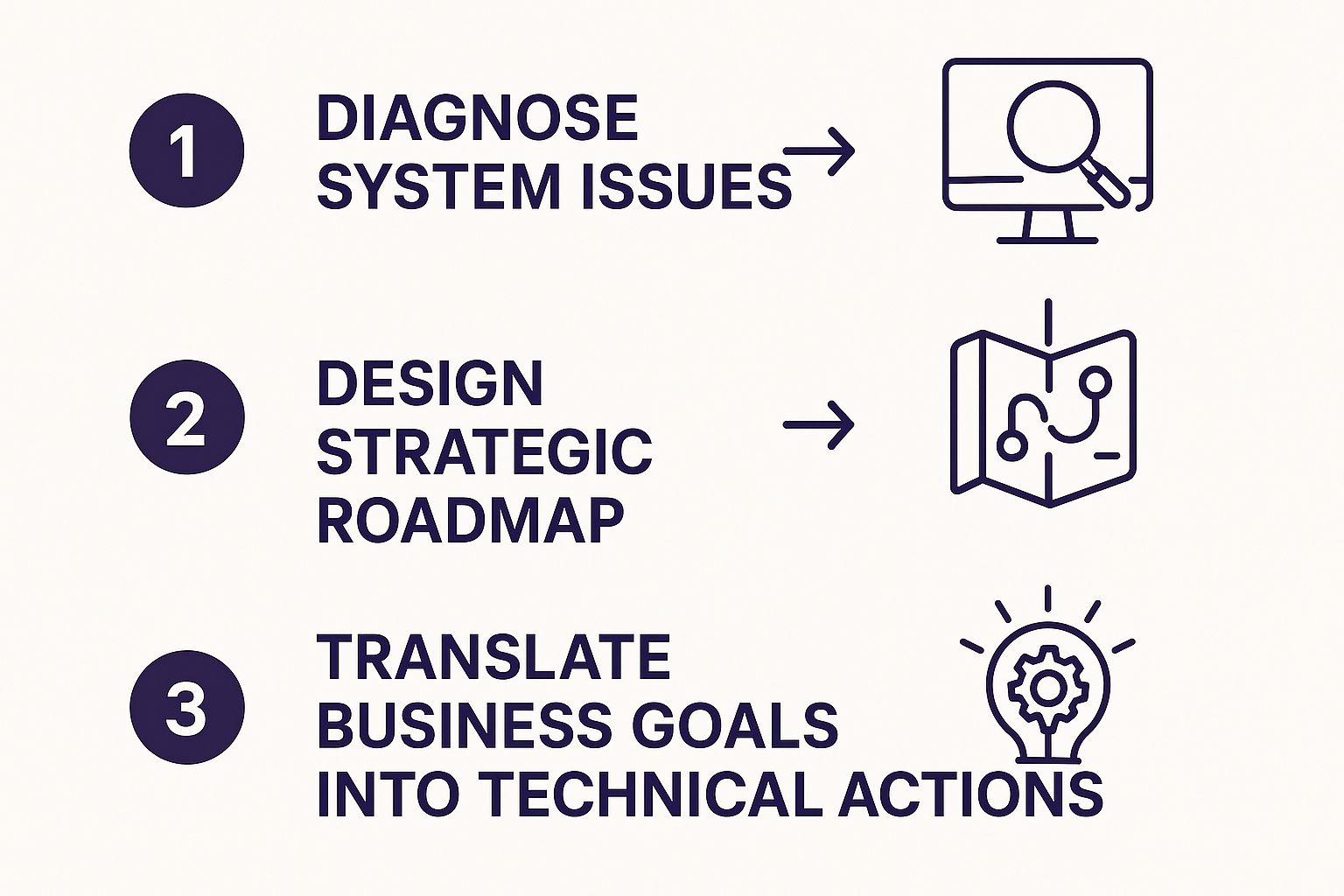
Have you ever stared at a bug report so strange it felt like the laws of physics were bending just for your application? Or maybe your team is locked in a fierce debate about which new technology to adopt, knowing that the wrong choice could set you back a year. We have all been there. That knot in your stomach is a signal that you might need a different kind of help.
This is where technical consulting comes in. Forget the stereotype of an expensive suit delivering a 200 page PowerPoint deck. Modern technical consulting is about bringing in a seasoned expert, a specialist who has navigated your exact kind of tech maze before, to help you find the way out.
Think of a technical consultant as a specialist doctor for your company's technology. You don't call them for a routine checkup; you call them when the diagnosis is tricky and the stakes are high.
What Is Technical Consulting Anyway? A Story
Let me tell you about a client. Their team just pushed a new feature live. Everything looked great in the testing environment, but in production, it was a disaster. API latency was through the roof. Servers were groaning under the load, and the whole system felt like it was about to fall over. Panic was setting in. Customers were complaining.
This is the exact moment a technical consultant steps in. They are not just another coder to throw at the problem. They are a guide who has seen this crisis play out countless times. I once spent two days chasing a similar bug only to find it was caused by a misconfigured network timeout—a one line fix that was invisible until you knew exactly where to look.
A great consultant is part detective, part architect, and part translator. Their job is not just to write code. It is to diagnose deep seated system issues, design resilient solutions that last, and—this part is critical—bridge the gap between what the business needs and what the technology can actually do. Their real value comes from a fresh, unbiased perspective combined with specialized expertise an in house team, busy with day to day fires, might not have.
The process usually follows a clear path: diagnose the problem, design a strategic roadmap to fix it, and then help translate those business goals into concrete technical actions.

As this shows, it is not about a quick patch. True consulting is a structured journey that moves from identifying the root cause all the way to strategic implementation. It is a multi faceted role, and it is becoming more critical every day.
The Growing Demand for Expertise
The need for this kind of specialized guidance is absolutely surging. Global information technology spending is on track to hit a staggering $5.61 trillion in 2025, a leap of nearly 9.8% from the year before.
This explosive growth is fueled by an urgent need for digital transformation, automation, and AI powered solutions. In fact, 77% of executives now believe AI will fundamentally change how their IT systems are built and managed. You can explore more about these technology consulting trends to see just how quickly businesses are scrambling to adapt.
A Day in The Life of a Tech Consultant

So, what does a technical consultant actually do all day? Forget the stereotype of a lone coder in a dark room. The reality is a dynamic mix of detective work, strategic planning, and a surprising amount of human interaction.
Let's follow a consultant—we'll call her Alex—who's been brought in to help a startup whose flagship application is slow, buggy, and bleeding users.
Her day does not kick off with firing up a code editor. It starts with people. Alex spends the first few hours in stakeholder interviews, talking to the Head of Product, a frustrated customer support lead, and a couple of junior engineers. Her job is to understand the pain points from every angle. It's not just about the technical symptoms; it's about the real business impact.
From Diagnosis to Design
With that context, Alex shifts gears and dives into a full system audit. She's not just scanning code. She's meticulously examining the cloud architecture, the CI/CD pipeline, and the monitoring dashboards. She's looking for patterns, bottlenecks, and those small architectural decisions made years ago that are now causing major friction.
A consultant's true value often lies in seeing the forest for the trees. An internal team can be so focused on daily fires that they miss the systemic issues causing them.
By midday, she's formed a hypothesis. The core problem isn't just "bad code" as the team thought. It's a poorly designed database schema that's buckling under the current user load. This is a classic consulting scenario where the initial problem is just a symptom of something much deeper.
Now comes the crucial translation step. She cannot just walk up to the non technical CEO and say, "We need to refactor the data model." Instead, she frames it in language they understand: "Our current setup is like trying to find a book in a library with no catalog. We need to build that catalog so everyone can find what they need instantly, making everything faster and more reliable."
Her afternoon is all about crafting a phased solution. This isn't just a list of technical tasks; it's a strategic roadmap.
- Phase 1: A short term patch to immediately relieve the most critical performance bottlenecks and stop the bleeding.
- Phase 2: The longer term redesign of the database and its related services to fix the root cause.
- Phase 3: Implementing better observability and monitoring so the team can spot future issues before they become emergencies.
This roadmap includes a timeline and a resource plan. For a startup trying to manage cash flow, getting a realistic software project estimate is everything, and this is where an experienced consultant's input is invaluable.
The day wraps up with her presenting this clear, actionable plan, managing expectations, and getting the entire team—from engineering to leadership—bought in and ready to move forward.
How Consultants Create Real Business Value

So, why shell out for an outsider's opinion when you've got a perfectly capable team in house? It's a fair question, and one I hear a lot. The answer really boils down to three things a great consultant brings to the table: perspective, expertise, and speed.
Your internal team lives and breathes your systems every single day. That is a huge strength, but it can also lead to blind spots. They're so close to the code, the project history, and the office politics that they can miss the forest for the trees. A consultant walks in with a clean slate, totally free from legacy baggage.
A consultant's real superpower is asking the "dumb" question that everyone else is too afraid to ask. More often than not, that simple question uncovers the root of a deep, systemic problem.
This outsider perspective is what allows them to challenge the "way things have always been done" and spot major inefficiencies that have become invisible to the people who deal with them daily.
Accelerators and Specialists
Beyond just a fresh pair of eyes, consultants are project accelerators. Think of them as the catalyst that breaks through roadblocks when a critical initiative gets stuck in the mud. They are not bogged down by the company's day to day operations, which lets them focus with laser precision on delivering a specific outcome—and fast.
This focus is a huge boost for key metrics, a core part of engineering productivity measurement that has a direct line to your bottom line.
They also bring specialized skills that would be incredibly expensive to hire for full time. Need a cloud migration expert for a three month project? Bringing in a consultant is far more cost effective than the lengthy and expensive process of recruiting, hiring, and onboarding a permanent employee for a temporary need.
I saw this firsthand with a client whose big feature launch was completely blocked by a bizarre, intermittent bug. Their internal team had spent weeks chasing ghosts. I came in, and within two days, I pinpointed a fundamental architectural flaw in their asynchronous task queue.
We redesigned the workflow, and the feature shipped the following week, saving the entire launch. Many consultants get these kinds of wins by specializing in understanding workflow automation to untangle exactly these kinds of messy processes.
The Rise of Specialized and Independent Experts
The consulting world has definitely changed. Not too long ago, the default move for any big technical problem was to get one of the massive, brand name firms on the phone. But that playbook is getting old, fast. Today, the game is all about specialization and agility.
Businesses are catching on that for specific, deep rooted technical challenges, a generalist approach just does not cut it. Why bring in a giant firm with layers of overhead when you can get direct access to a top tier expert who lives and breathes your exact problem? This simple question is fueling the rise of boutique firms and independent technical consultants.
Why Niche Expertise Wins
The modern way of thinking is simple: go straight to the source. It's a smarter way to work, and frankly, it's a win for everyone involved.
- Faster Solutions: Specialists have seen your "unique" problem dozens of times. They recognize the patterns instantly, which means they diagnose and solve things much quicker than a generalist team that's still getting up to speed.
- Flexible Engagements: You can bring in an expert for a precise, short term project. No need for a massive, long term retainer when all you need is a surgical strike.
- Direct Access: Forget playing telephone through layers of account managers and junior staff. You work directly with the talent doing the actual work.
And this is not just a gut feeling; the data backs it up. We're seeing a huge shift toward a more flexible, on demand workforce. A joint study by Harvard Business School and BCG found that out of nearly 700 senior leaders, 40% reported real boosts in speed and productivity by using digital platforms to find independent experts. You can dig into more consulting industry statistics to see just how much this agile model is shaking things up.
This is more than a passing trend. It's a fundamental change in how companies solve problems and defines what technical consulting looks like in the modern era.
When You Should Hire a Technical Consultant

Hiring a consultant is a big decision, and honestly, the timing is everything. Pull the trigger too early, and you burn cash. Wait too long, and a small technical fire can turn into a full blown crisis that grinds your business to a halt. Nailing that moment is a game changer.
One of the clearest signals is when you're standing at a major technology crossroads. I'm talking about those high stakes decisions with no obvious answer—planning a massive system migration, picking a new framework, or designing an architecture that will define your product for the next five years. This is where an outside expert can save you from a very expensive wrong turn.
Another classic trigger is when your team is just plain stuck. If they've been wrestling with the same nasty performance bug for weeks or can't seem to crack a complex technical roadblock, it's time for fresh eyes. An external expert brings a jolt of new perspective and, crucially, the experience of having solved that exact problem somewhere else before.
A Checklist for Making the Call
It often helps to step back and ask a few blunt questions. If you find yourself nodding "yes" to a couple of these, it's probably time to start making some calls.
- Is your team lacking specific, critical expertise? Maybe you need to build a rock solid, secure payment system but have no in house security specialists. That's a huge red flag.
- Are you facing a high risk project? This could be a complex acquisition where you desperately need a deep dive into the tech you're about to buy. A solid technical due diligence checklist can uncover skeletons you'd much rather find now than after the deal is signed.
- Do you need an unbiased, outside opinion? Let's face it, internal politics or "we've always done it this way" thinking can cloud judgment. A consultant brings a neutral, fact based viewpoint to the table.
- Are you staring down significant legal or compliance risks? Things like navigating web accessibility lawsuits or other regulatory hurdles require specialized knowledge. You do not want to guess here.
Ultimately, the decision boils down to this: you hire a consultant when the cost of not solving a problem correctly and quickly far outweighs the cost of bringing in an expert to get it done right the first time.
Frequently Asked Questions About Technical Consulting
Even with a good grasp of what technical consulting is all about, a few common questions always seem to surface. Let's tackle some of the ones that are probably on your mind.
What Is The Difference Between a Technical Consultant and a Management Consultant?
This is a great question because the two roles can sometimes seem to overlap. Here's a simple way I like to think about it:
A technical consultant lives in the world of how. They're the ones rolling up their sleeves to solve tangible problems with code, system architecture, and infrastructure. Think optimizing a slow database or building a secure API—they are the builders and the problem solvers on the ground.
On the other hand, a management consultant operates in the realm of why and what. They're focused on the bigger picture: business strategy, market positioning, and operational efficiency. One is engineering the engine; the other is designing the racetrack and planning the race.
How Much Do Technical Consultants Typically Cost?
There's no single answer here—it's a classic "it depends" situation. The cost can vary dramatically based on the consultant's experience level, their specific expertise, and the project's scope. An independent freelancer might charge by the hour, whereas a larger consulting firm will likely quote a fixed price for the entire project.
But the real question is not about the cost, it's about the potential return on that investment. A top tier consultant might seem expensive upfront, but if their expertise prevents a multi million dollar architectural mistake down the line, their fee suddenly looks like an incredible bargain.
Can a Small Business Benefit From Technical Consulting?
Absolutely. In fact, you could argue that small businesses and startups stand to gain the most. It's just not feasible for most small companies to hire a full time, in house expert for every piece of technology they rely on, from cloud infrastructure to the latest in GenAI.
This is where a consultant becomes a force multiplier. You get access to world class expertise for a specific, critical project—like a security audit before a big launch or a migration to the cloud—without the hefty overhead of a senior full time salary. It's a powerful way to punch well above your weight class.
The consulting world itself is adapting to this need. With technology and cybersecurity threats moving so fast, companies want more than just advice; they want partners. This has pushed nearly 60% of consultants to focus on building deeper relationships with six or fewer clients per year. You can discover more about these consulting industry trends to see how the industry is shifting towards quality over quantity.
If your startup is wrestling with a tough technical challenge and needs an expert to help clear the path on your roadmap, Kuldeep Pisda can help. From building production grade Django backends to implementing complex AI and VoiceAI systems, I bring the hands on expertise needed to create scalable, maintainable, and secure solutions. Let's build something great together.
Become a subscriber receive the latest updates in your inbox.


Member discussion